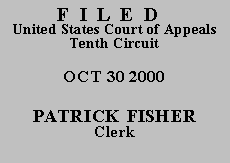

| DARREN E. PERKINS, |
|
Before BRORBY, KELLY, and
MURPHY, Circuit Judges.
After examining the briefs and appellate record, this panel has determined
unanimously that oral argument would not materially assist the determination of
this appeal. See Fed. R. App. P. 34(a)(2); 10th Cir. R. 34.1(G). The case is
therefore ordered submitted without oral argument.
Appellant Darren Eugene Perkins, a state inmate appearing pro se, appeals the district court's decision denying his habeas petition filed under 28 U.S.C. § 2254. In denying the petition, the district court found Mr. Perkins' claims inappropriate for federal habeas corpus review because he challenged only the application of state law in calculating his sentence.
On appeal, Mr. Perkins raises the same issue addressed by the district court. Specifically, he alleges the state trial court improperly computed his sentence under provisions of the Kansas Sentencing Guidelines Act, Kan. Stat. Ann. §§ 21-4701 to 4728.
"In conducting habeas review, a federal court is limited to deciding whether a conviction violated the Constitution, laws or treaties of the United States." Estelle v. McGuire, 502 U.S. 62, 68 (1991). "Relief under 28 U.S.C. § 2254 does not lie for errors of state law." Richmond v. Embry, 122 F.3d 866, 870 (10th Cir. 1997) (denying consideration of petitioner's claims based on violations of state law.).
A review of the record establishes Mr. Perkins' claims of error are premised on alleged violations of state sentencing laws. Therefore, his claims are not actionable under § 2254 and do not demonstrate a substantial showing of the denial of a federal constitutional right, as required under 28 U.S.C. § 2253(c)(2).
Accordingly, we deny Mr. Perkins' request for a certificate of appealability and DISMISS his appeal.
Entered by the Court:
WADE BRORBY
United States Circuit Judge
*. This order and judgment is not binding precedent except under the doctrines of law of the case, res judicata and collateral estoppel. The court generally disfavors the citation of orders and judgments; nevertheless, an order and judgment may be cited under the terms and conditions of 10th Cir. R. 36.3.